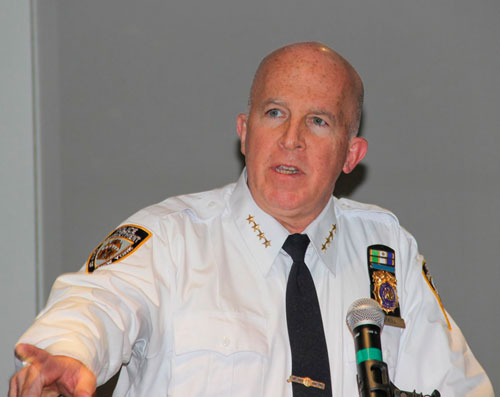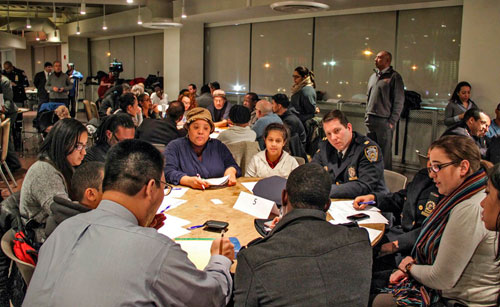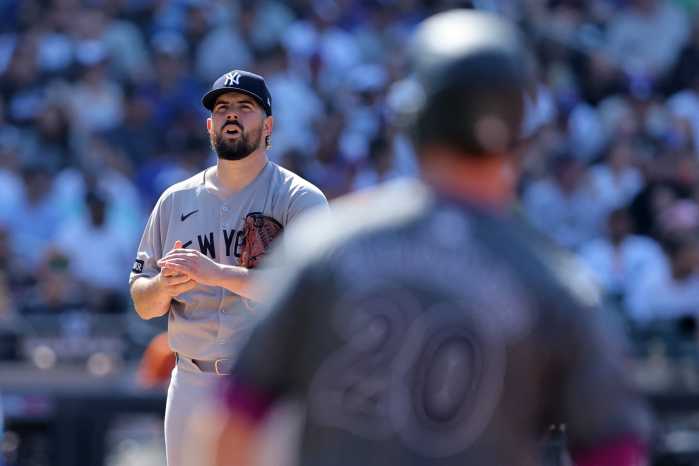In spite of the cold, snow and ice last week, Alianza Dominica Cultural Center in Washington Heights was filled. There were more than 30 cops including two police chiefs and four commanding officers with five upper Manhattan police precincts being represented. And there were many northern Manhattan young people, too.
This was the goal when Manhattan Borough President Gale Brewer joined forces with civil rights attorney Norman Siegel and invited youth, community leaders, and the cops to dialogue on issues of policing and the community. Recognizing the breakdown of trust between police and the community, Norman Siegel launched this initiative to develop a public process where all community voices could be heard.
After opening remarks by NYPD Chief of Department James P. O’Neill and Upper Manhattan Chief Kathleen O’ Reilly, Norman Siegel emphasized how he and the borough president are committed to explore the issues together in a respectful dialogue, the essence of democracy.
“We need to understand the criticism, grievances, and recommendations of each side,” he said. In equal numbers, youth, police and community leaders sat in 12 circular tables. He posed issues to them to be examined including failure of “broken windows” and why some have called for an independent prosecutor to address allegations of criminal police misconduct.
“We cannot deny the gulf between City Hall and the police union,” he acknowledged. “We must confront these issues together. Together.”
Others spoke of the need for a tough, honest conversation, and core principles. “We want crime to go down, the police to be safe, and fairer treatment regardless of color of skin,” said Councilman (West Harlem) Mark Levine.
“This is an important conversation for our future,” said Upper Manhattan Councilman Ydandis Rodriguez, longtime community activist who has been arrested twice as part of political demonstrations and activities. Rodriguez gave examples of his confronting ethnic stereotype experiences while growing up.
The 125 attendees, in small groups facilitated by clergy, nonprofit, and other community leaders, then discussed issues of relations with the police, civil rights, and community safety, offering observations and recommendations.
During the small group discussion high school senior Nicole Saladin, 20, said, “We get stopped for things that are not that serious. There is a lot of unnecessary drama that escalates the situation.”
Harlem Precinct Captain Obe spoke of the three-day training coming to all the precincts and the trial run for body cameras in select precincts. She mentioned the need for modernizing buildings, equipment, and providing tablets to officers.
At the end of the conversation sessions, representatives from each group reported to all.
“Sometimes people are being arrested and they aren’t told of why,” one group reported. One community leader commented that kids are being hassled for weed (legal in some states), which is not an issue.
There should be more police accountability was another observation. It was noted also that precincts should be more community friendly, where residents felt welcomed not alienated. Along these lines were recommendations for greater access to information exchange including the use of social media to let people know about meetings in the neighborhood.
After the reports, Siegel summed up the feedback and recommendations.
Almost all the groups spoke of the need for better communication between the police and the community. Most of the groups wanted more foot patrols so police can get to know the community and the community could know their “beat cop.”
Civic classes are needed for youth to know their rights and responsibilities was another concern. Residency issues came up: police should live in New York. The implementation of body cameras was a recommendation all agreed upon. Reiterated was the need for better training to undo stereotypes, racism and other “isms.” Finally, it was pointed out how community civilian review boards need to be decentralized.
During the Manhattan Borough President’s State of the Borough address last Sunday, Gale Brewer mentioned how meaningful this Washington Heights dialogue was among youth, leaders and police.
This is the first of three such meetings in Manhattan and it is hoped that this forum format — bringing the community and police together — will be implemented in the other boroughs to generate ideas for improving relations.























